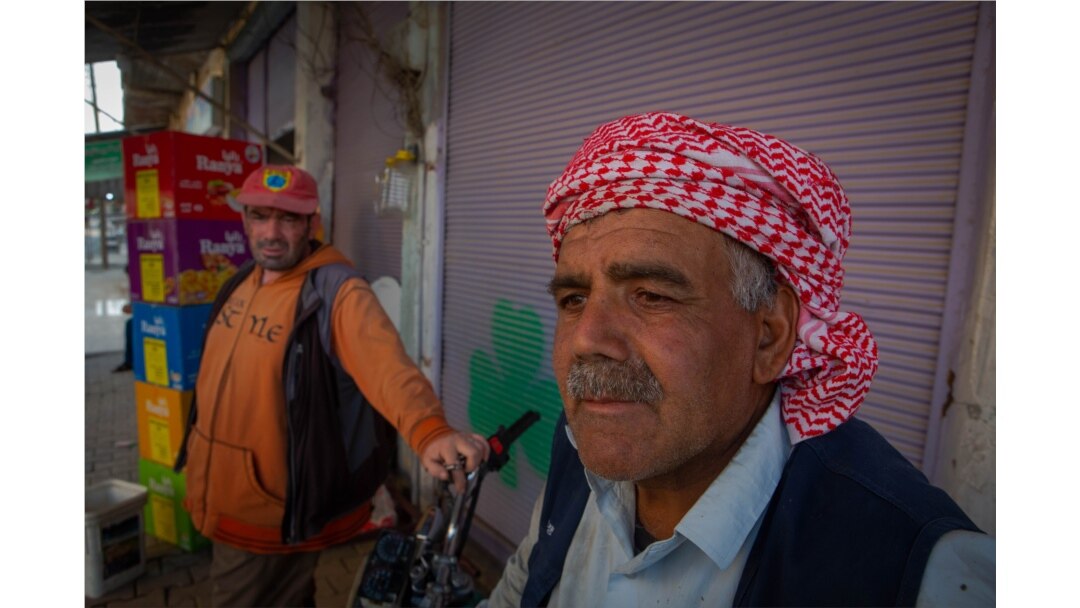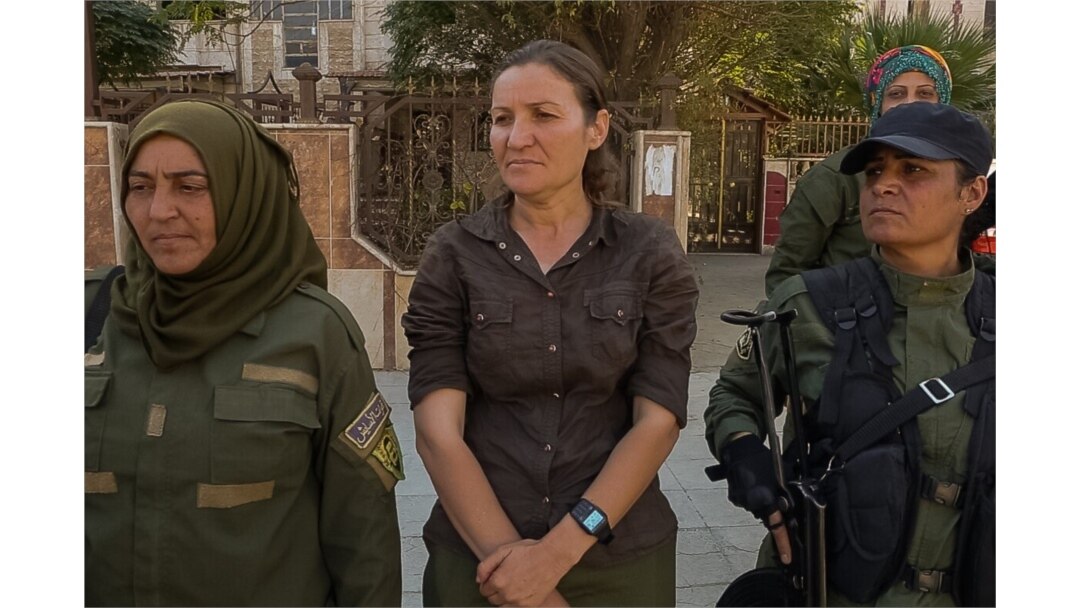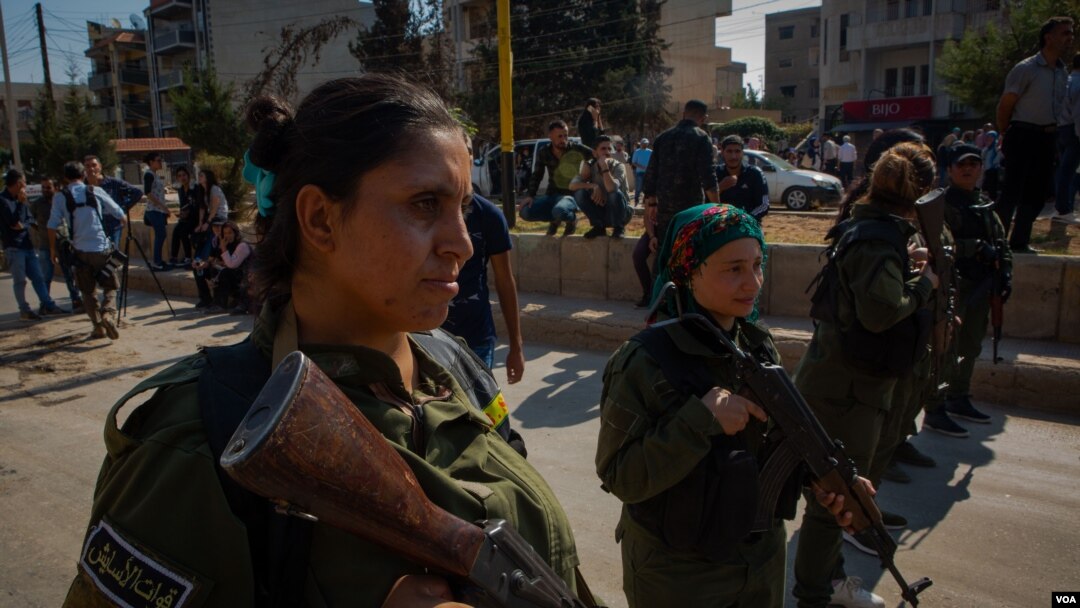A mournful song was heard on the streets of Qameshli on Wednesday, as about a hundred people rallied in support of northeastern Syrian Kurdish forces.
The fighting is over along the Syrian border with Turkey, for now, but no one we spoke to could picture what will happen next.
"Fighters, take revenge for mothers who lost their sons," the man's voice sang in Kurdish, before an organizer picked up the microphone to announce funerals taking place the next day.

Abdulwakeel, a 51-year-old mason, says the dream of a self-governing Kurdish lead state has died amid recent battles, in Dirik, Syria, Oct. 23, 2019. (Yan Boechat/VOA)
On Tuesday night, a five-day pause in hostilities between Turkey and Kurdish-led forces ended in a deal between Turkey and Russia. The deal requires the main Kurdish fighting force, the YPG, to pull all troops and weapons 30 kilometers back from the border with Turkey.
Syrian government and Russian troops already are moving throughout the region, which has been a semi-autonomous zone, governed by the Kurds since 2011.
"We dreamt of a country where everyone would live together like brothers," said Abdulwakeel, a 51-year-old mason, leaning on his motorcycle. "This dream is over."
Unclear future
At the rally, though, some security officers displayed stoic optimism as one reporter described the events as a crushing defeat.
"We are the owners of this land," said Haval Heline, 34. "We will fight for it until our last drop of blood."

Haval Heline, 34, says her troops will never give up, despite recent losses. "We will fight for it until our last drop of blood," she says. (Yan Boechat/VOA)
But on a shady curb nearby, Layla, a 40-year-old mother of three, said that for her, the future is entirely unclear. Kurdish forces cannot beat Turkey, Russia and the Syrian government. At the same time, she cannot imagine what life will be like if Damascus takes over local governance, with the support of Russia.
In 2018, Layla and her family fled Afrin, as Turkish-backed Syrian fighters took the then-Kurdish-controlled city. Like many people we spoke to, she said the Syrian government is less frightening to her than Turkey or its proxies.
And like every other person we spoke with, she blamed the United States for the loss of lives, homes, and self-determination over the past two weeks.
The fighting began after U.S. President Donald Trump suddenly announced he would be pulling troops out of Syria less than two months after promising to patrol a buffer-zone between the enemy forces.
"We never believed that America would abandon us," Layla said. "They betrayed us."
WATCH: Kurds in Syria Mourn Loss of Lives, Territory
Your browser doesn’t support HTML5
Kurds in Syria Mourn Loss of Lives and Territory
IS attack
Roughly an hour after Layla spoke, a car bomb exploded in a nearby neighborhood, believed to be the work of Islamic State (IS) militants. Since Turkey began its military incursion, some militants have escaped prisons, while the families of IS fighters have rioted in camps.
Kurdish-led forces have warned repeatedly they need international support to control the camps and prisons holding tens of thousands of fighters and their families.
"If things get worse outside, we won't be able to stop them," said Layla Rezgar, at al-Hol, a refugee camp that is detaining 71,000 people, mostly women and children related to IS fighters.
Tens of thousands of Islamic State fighters and their families are detained in camps and prisons secured by Kurdish-led forces, in al-Hol Camp, Syria, Oct. 17, 2019. (Yan Boechat/VO
The section she heads, she added, holds 9,000 people from 58 countries. They are families that retreated with IS for years before the "Caliphate" fell, and many are among the most extreme among the extremists.
A large number of countries have refused to repatriate their nationals and experts say the resurgence of IS is the likely outcome of further chaos in Syria.
"The children here throw stones at school teachers who are not veiled," Rezgar told us. "They call them infidels."
'Rojava dream'
As Syrian government and Russian troops spread throughout northeastern Syria, locals told us that the question of who will be in charge of what cities and towns is on everyone's minds.
At a small cafe in Dirik (or Malikeya, as it is known in Arabic), men played cards and drank tea on Wednesday, saying they don't have a guess as to what will happen next.
At a tea shop, Turkey Hussain, right, says Kurdish forces cannot win in a fight against Turkey without international support, in Dirik, Syria, Oct. 23, 2019. (Yan Boechat/VOA)
"We cannot imagine what Russians and government forces will be like," said Turkey Hussain, 60.
When the U.S. was still on the ground near the borders, it deterred Turkish military operations. The Turks, however, regarded those operations as necessary for national security. Turkey sees the YPG as a terrorist organization akin to the PKK, which has been attacking Turkey for decades.
Before the withdrawal, the U.S. officially supported an umbrella organization called the Syrian Democratic Forces against IS militants. By default, that meant the U.S. was supporting the YPG.
SDF and YPG officials have long held they have no interests outside of Syria, but they share supporters and icons with the PKK.
A man sits at a garden memorializing deceased Kurdish fighters in Dirik, Syria, Oct. 23, 2019. (Yan Boechat/VOA)
Despite this connection, Kurdish fighters captured the imagination of the Western world as they battled IS in 2014. They retook land overrun with militants, promising to turn the region — called Rojava in Kurdish — into a self-determined, self-sufficient region that supports gender equality and ethnic diversity.
This idea became known as the "Rojava dream," drawing foreign fighters and aid workers, as well as the support of many inside northeastern Syria. And while some people lament the end of this dream, the men at the tea shop said perhaps it has just paused.
"Where there are good people, there is always hope," Hussain told us.
In the past two weeks, hundreds of people have died and hundreds of thousands of people have been displaced in a lop-sided war Kurdish forces could never have won without international support, the men said.
"If we had fighter planes like that we could fight them, but we are fighting with AK-47s," Hussain explained. "At least for now the shelling has stopped and our children can sleep."


